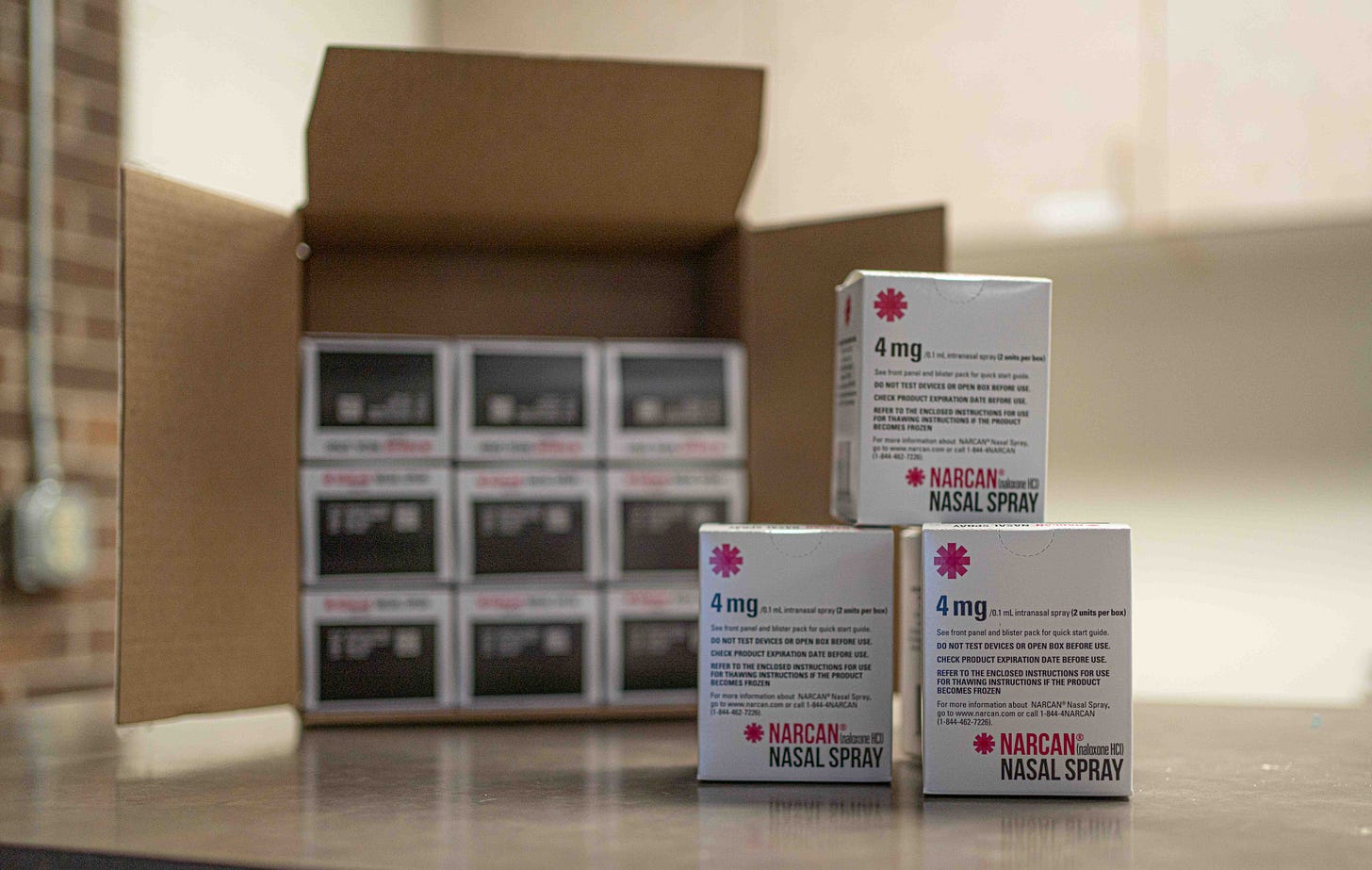LPD officers to start carrying, administering Narcan
Naloxone, better known by its brand name Narcan, can save a drug user’s life mid-overdose. Patrol and other officers will now carry that potentially life-saving medication and train in its use.
Laramie patrol officers will be adding the overdose prevention drug Narcan to their duty belts thanks to a Wyoming Department of Health grant. The Laramie Police Department joins the Albany County Sheriff’s Office and other local medical response teams in carrying the potentially life-saving drug while on duty.
“With this surge of heroin and fentanyl, it's just time that we get with the program,” LPD Assistant Chief Robert Terry said. “We're gonna give it to all of our people in hopes they'll never have to use it — but if they do, they'll have it with them and they can administer it either to a fellow officer or civilian.”

Narcan is a brand name for naloxone, an opioid antagonist that works by reversing the effects of an ingested opioid during an overdose.
“What opioids and heroin do is they bind to receptors — which are found all over the body and in the brain — called opioid receptors,” said Paige Morgan, a neuroscientist teaching anatomy and physiology at Laramie County Community College. “Narcan is called a competitive opioid receptor antagonist. What that means is that it binds to the same receptors that heroin and other opioids bind to.”
Morgan said this is due to Narcan “having a higher affinity, meaning that it's more likely to bind to that receptor. Narcan will kick those opioids out of that receptor binding site.”
With Narcan hogging the limited supply of opioid receptors in the brain, heroin, fentanyl or other opioids can’t find purchase and can’t make their presence felt.
“So it will basically temporarily turn off activity of that receptor for a typical lifespan of 45 minutes — which is hopefully enough time for patients to recover from potential respiratory depression,” Morgan said.
Narcan was recently approved by the Federal Drug Administration for over-the-counter use amid an ongoing opioid epidemic in the United States.
Wyoming is no exception to this epidemic. The Cowboy State has seen an increase of reported opioid-related deaths. The Wyoming Department of Health states in a recent report that at least 106 Wyomingites died from opioid overdoses in 2021.
“It seems like that's been upticking,” Terry said. “Fentanyl is definitely here in Laramie. It's made its presence (known) and it's destroying people. We've had issues where they've overdosed and we haven't got to them in time or they weren't discovered in time. Those couple seconds can truly be lifesaving.”
Fentanyl is often taken unintentionally. In the black market where drugs are bought and sold, there are no regulations and few quality controls, so fentanyl can be used by unscrupulous manufacturers to cut a product and lower the overhead at the cost of the buyer’s safety. Fentanyl is more potent than heroin, meaning it has a lower effective dose — and a lower lethal dose. A drug user who believes they’re taking heroin might measure out an appropriate — or at least non-life-threatening — amount of heroin. But if that heroin is actually not heroin and is instead fentanyl, that same amount will be too much.
A similar dynamic exists with LSD — which is impossible to overdose on — and NBOMe, a drug with similar effects but much lower effective and lethal doses. This mismatch between what drug users think they’re taking and what they are actually taking frequently costs lives.
Drug reform and legalization advocates argue these deaths are attributable to the prohibition on drugs and the United States’ federal War on Drugs. Decriminalizing or legalizing drugs, these advocates argue, would make drug use less deadly.
Incoming and current LPD officers will have to undergo a 30-minute one-time training for certification to carry and use Narcan while on patrol.
LPD’s acquisition of 95 boxes — with two doses in each box — was made possible by a Wyoming Department of Health program. Terry said the boxes usually run $47 a piece, so buying the life-saving nasal spray in mass commodities would have been nearly impossible without the program.
But even before the program provided those 95 boxes, some LPD officers had already been carrying Narcan, acquiring the drugs themselves for use on patrol. Terry said one LPD police officer even used Narcan earlier this year to save an individual's life.
Patrol officers won't be the only ones to benefit from the program. Law enforcement desk clerks, evidence technicians, dispatch, community service officers and even animal control will also start carrying Narcan.
“The idea is that we are covering all our bases,” Terry said. “They'll be trained to recognize those effects, administer it, get them the help they need. Hopefully they never need it, but if they do, they're gonna have it with them and potentially save lives.”
Providing police and other emergency responders with Narcan represents a move toward treating drug abuse or overdose as an issue of healthcare, not crime. Drug policy reformers have generally praised that move, but not everyone is happy about it. Some object to treating drug abuse as anything other than criminal.
“You'll always have a group of people that, no matter what it is, don't agree with it,” Terry said. “But I think the majority of people see what's going on if they're watching the news — or if you have kids going to school, if you have young people even. This drug doesn't discriminate if you're young, old, rich, poor, you name it, it's affecting everybody and so I think the majority of people will be happy that it's available.”




